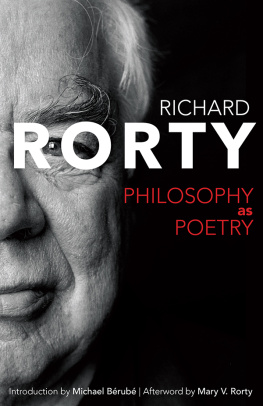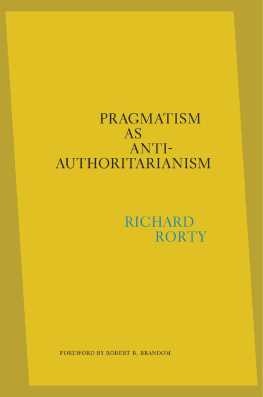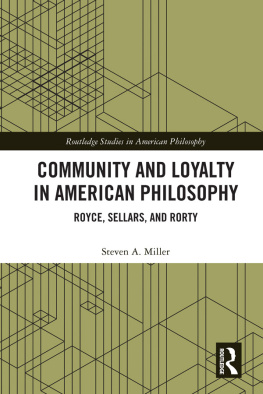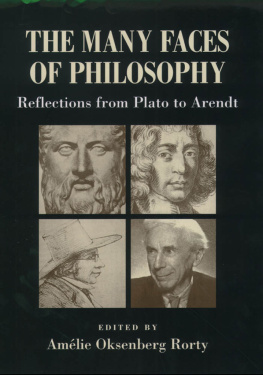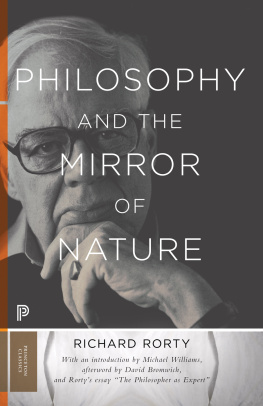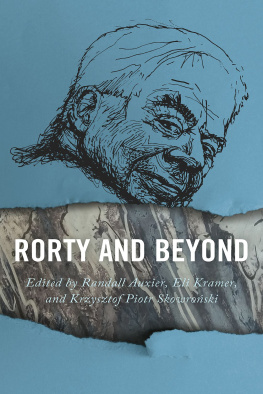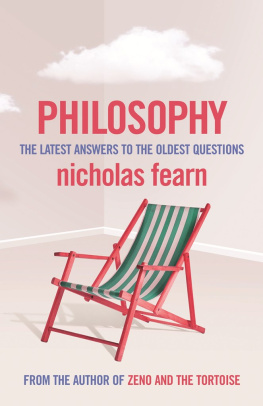PHILOSOPHY as POETRY
RICHARD RORTY
UNIVERSITY of VIRGINIA PRESS
Charlottesville & London
University of Virginia Press
2016 by the Rector and Visitors of the University of Virginia
All rights reserved
Printed in the United States of America on acid-free paper
First published 2016
ISBN 978-0-8139-3933-9 (cloth)
ISBN 978-0-8139-3934-6 (e-book)
9 8 7 6 5 4 3 2 1
Library of Congress Cataloging-in-Publication Data
Names: Rorty, Richard, author.
Title: Philosophy as poetry / Richard Rorty.
Description: Charlottesville : University of Virginia Press, 2016.
Series: Page-Barbour lectures for 2004 | Includes index.
Identifiers: LCCN 2016022491| ISBN 9780813939339 (cloth : alk. paper) | ISBN 9780813939346 (e-book)
Subjects: LCSH: Philosophy, American20th century. | Rorty, Richard.
Classification: LCC B945.R523 P44 2016 | DDC 191dc23
LC record available at https://lccn.loc.gov/2016022491
Jacket photo: Steve Pyke/Getty Images
PAGE-BARBOUR
LECTURES
for 2004
INTRODUCTION
The Assent of Man
MICHAEL BRUB
T HE THREE PAGE-BARBOUR LECTURES THAT MAKE UP Philosophy as Poetry mount an argument that will come as no surprise to people familiar with the work of Richard Rorty; but by the same token, they offer a useful introduction to his distinctive form of American pragmatism. If you are trying to understand why Rorty was as influential and as controversial as he was, these lectures are a very good place to start. Rorty was often consideredespecially by critics outside the world of academeto be one of those postmodernist-nihilist-antifoundationalist-poststructuralist-sophist-relativists who corrupt our youth and whose success offers right-thinking people a barometer of the intellectual decline of the American university. (This sentence should properly be concluded with a loud harrumph.) But unlike most post-this-or-that philosophers, Rorty wrote in the plain style, free of technical language and clever neologisms, and remained determinedly optimistic about vanilla liberal democracy; indeed, Rorty believed that postmodernists and poststructuralists were on the wrong trackthat they were right to reject the idea that philosophy should appeal to something external to human experience in its search for Truth, but wrong to reject the liberal pragmatism that tries, however modestly, to make life a little better for people if it can.
In these pages, then, you will read that it is a mistake to think of philosophy as the search for access to, and objective knowledge about, the transcendent and the ineffable. And you will be advised that it is a mistake not in the sense that such access and knowledge do not correspond to the way things-in-themselves really are (for that would be still more Platonism, dividing false appearances from real reality), but in the sense that the pursuit of such access and knowledge leads only to annoying headaches and the fruitless generation of philosophical pseudoproblems. So if you are already familiar with this terrain, the argument itself is not a surprise; it is not as if we have searched through Richard Rortys papers and found the anomalous series of lectures that throws our understanding of his career into crisis, the lectures that insist that philosophy should, if practiced properly, produce objective knowledge about the ineffable. It is, however, something of a surprise that this iteration of the argument has not, until now, seen the light of daywith its beavers, mud, and sticks (in the first lecture) and with its insistence (throughout) that language, and human thought, begins only when one grunter of sounds can rationally assent to or criticize the sounds of a fellow grunter. I will say more about those aspects of the argument belowthe beavers and the grunting, or meta-grunting, and the importance of assentfor both are important to how Rorty understands human intelligence, the prospects for human life, and the limitations of human finitude. I will also offer a reading of Rortys rhetoric, his habitual and canny framing of his arguments in terms of what we will have appreciated about them once they have become part of ordinary human common sense. I want to open, however, by telling a story about surprises in the archives.
It was May 2010, and the occasion was a one-day conference at the University of California, Irvine, organized to mark the opening of the Richard Rorty Papers in the UC Irvine Libraries Critical Theory Archive. The conference was convened by Liz Losh and was titled, after one of Rortys catchier aphorisms, Time Will Tell, but Epistemology Wont. I decided to show up a day early and spend some hours leafing through the archives, just to see what I could see. I had been Rortys student once, twenty-five years earlier, and he had served on my dissertation committee as the outside reader (that is, the reader outside the English department), but I did not know him well as a person. I saw some useful things, including this very Rortyan passage from a 1998 lecture titled How Relevant Is Postmodern Philosophy to Politics?: We shall only get the full benefit of either Hegelian historicism or pragmatist anti-representationalism when we have become as insouciant about the question did human beings have intrinsic dignity, and human rights, before anybody thought they did? as we are about the question did transfinite cardinal numbers exist before Cantor found a way to talk about them?
That will be a good dayor, more precisely, we will have realized, after that day comes, that it was a good day. And I was so pleased at having found this distilled quintessence of Rortyism that I decided to stop reading Rortys unpublished lectures and look instead at some of Rortys correspondence, just out of curiosity.
There were many things I was not surprised to find: a letter to Frederick Crews, complaining about people who take physics as the paradigmatic form of human knowledge and think that philosophy should aspire to be a kind of epistemological physics; a heartbreaking letter from Harold Bloom touching on various personal matters; routine professional correspondence, letters of recommendation, and so forth. I wasnt surprised to see my correspondence with Rorty from 199495, which consists of a series of letters about my second book, Public Access, in which Rorty chastised me for my dismissive attitude toward social democrats like Irving Howe and Arthur Schlesinger Jr., and I insisted in response that Schlesingers The Disuniting of America, like Richard Bernsteins Dictatorship of Virtue, was a hysterical book, devoted to the proposition that multiculturalism would eat away at the very fabric of American society. It was nice to see that exchange in its very own subfolder, but I remembered it well, and so moved on to...
A most curious artifact. Three sheets of yellow legal paper, covered with what appeared to be my handwriting. No, let me not fall back into the appearance-reality distinction: it was my handwriting. The letter was dated June 23, 1985, and it was basically an agonized request for an extension on my overdue paper. I have no idea why Rorty kept it, but reading it was genuinely unheimlich, as if I had been granted access to a parallel universe and allowed to revisit my much younger self. The situation was this: after taking Rortys Heidegger seminar that spring, I had the option of taking a final exam or writing a stand-alone paper. The exam was by far the easier option, and one of the questions, To what extent does part 1 of Being and Time advance a pragmatist theory of truth?, was an implicit invitation to go over our notes from the first four weeks of class and say, Well, it pretty much does, just like Rorty says it does. I didnt want to do that, because I thought I had my own little take on part 1 of
Next page
